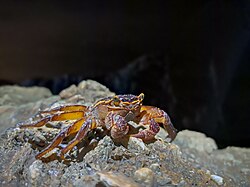Biology:Sesarmops
| Sesarmops | |
|---|---|

| |
| Sesarmops imperator | |
| Scientific classification | |
| Domain: | Eukaryota |
| Kingdom: | Animalia |
| Phylum: | Arthropoda |
| Class: | Malacostraca |
| Order: | Decapoda |
| Suborder: | Pleocyemata |
| Infraorder: | Brachyura |
| Family: | Sesarmidae |
| Genus: | Sesarmops Serène & Soh, 1970 |
Sesarmops is a genus of crabs in the family Sesarmidae. Its members are distributed through the Indo–West-Pacific oceanic region. They live in freshwater forest streams near the coast, and in mangroves.
Taxonomy
Sesarmops was defined in 1970 when Serène and Soh re-organised the existing genus Sesarma. They included five species: S. atrorubens, S. impressus, S. intermedius, S. mindanaoensis, S. sinensis.[1]
Ng et al. provisionally added Sesarma weberi in 2008,[1] Paulay and Starmer (2011) transferred Sesarma angustifrons to the genus in 2011.[2]
Culminating work through the 2000s and 2010s, the genus was revised in January and December 2020. Species were split and redefined, and two species were transferred to a new genus.
The type species Sesarmops impressum (formerly Sesarma impressa) and related species were reviewed by Ng et al. in 2020.[2] S. impressa sensu lato from the West Pacific have different colouration and gonopods to those of the Indian Ocean. Ng, Li, & Shih restricted S. impressesus to the west Indian Ocean populations, defining S. indicus in the East Indian and S. imperator in the West Pacific oceans. The type locality for S. indicus is the Andaman Islands, records from northern Sumatra, Mentawei Islands and Engano Islands are provisionally referred to the same species.
Hess's original types, from "Sydney", for S. atrorubens and S. similis are lost. Scholars believe that he received the specimens via Sydney, and that they were collected elsewhere. Ng et al. designated neotypes from Fiji and Samoa, respectively.[2]
Comparisons of mitochondrial DNA found that S. impressus and S. imperator form a clade sister to Bresedium eurypleon and B. brevipes, indicating that Sesarmops is paraphyletic to Bresedium.[2] S. mora is sister to the impressum–Bresidium clade, whilst the Sesarmops intermedius complex, Pseudosesarma patshuni, and the Chiromantes dehaani complex form another grouping. S. mindanaoensis was found to be more distantly related than the other Pseudosesarma species (edwardsii, boucourtii, crassimarum).[1] The latter group (intermedius–patshuni–dehaani) was re-classified into a new genus Orisarma by Schubart & Ng (2020), having five species.[3]
Species
As at 2023, the World Register of Marine Species recognises 9 species of Sesarmops, with two former species moved to Orisarma.[4]
- Sesarmops angustifrons (A. Milne-Edwards, 1869)
- Sesarmops atrorubens (Hess, 1865)[5]:149 – Fiji.[2]
- Sesarmops imperator Ng, Li & Shih, 2020 – East Asia to Taiwan and Ryukyus.
- Sesarmops impressus (H. Milne Edwards, 1837) – Madagascar, Comoros, Mayotte.
- Sesarmops indicus Ng, Li & Shih, 2020 – Andaman Islands. Possibly north Sumatra and nearby islands.
- Sesarmops intermedius = Orisarma intermedium (De Haan, 1835)[6]
- Sesarmops mindanaoensis (Rathbun, 1914) – Taiwan (Pingtung) and Philippines (Cebu and Bohol)[1]
- Sesarmops mora Li, Shih & Ng, 2020 – Taiwan (Pingtung), Philippines (Cebu and Bohol), Indonesia (Sulawesi and Manado)[1]
- Sesarmops similis (Hess, 1865)[5]:149 – Samoa.[2]
- Sesarmops sinensis = Orisarma sinense (H. Milne Edwards, 1853)
- Sesarmops weberi (De Man, 1892)
References
- ↑ 1.0 1.1 1.2 1.3 1.4 Li, Jheng-Jhang; Shih, Shih-Te; Ng, Peter K. L. (1 January 2020). "The Taiwanese and Philippine Species of the Terrestrial Crabs Bresedium Serène and Soh, 1970 and Sesarmops Serène and Soh, 1970 (Crustacea: Decapoda: Brachyura), with Descriptions of Two New Species". Zoological Studies 59 (16). doi:10.6620/ZS.2020.59-16. https://zoolstud.sinica.edu.tw/Journals/59/59-16.pdf. [1] [2]
- ↑ 2.0 2.1 2.2 2.3 2.4 2.5 Ng, Peter K. L.; Li, Jheng-Jhang; Shih, Hsi-Te (1 January 2020). "What is Sesarmops impressus (H. Milne Edwards, 1837) (Crustacea: Brachyura: Sesarmidae)?". Zoological Studies 59: 27. doi:10.6620/ZS.2020.59-27. https://www.researchgate.net/publication/342841693_What_is_Sesarmops_impressus_H_Milne_Edwards_1837_Crustacea_Brachyura_Sesarmidae. Retrieved 4 November 2023.
- ↑ Schubart, Christoph D.; Ng, Peter K. L. (2020-12-23). "Revision of the intertidal and semiterrestrial crab genera Chiromantes Gistel, 1848, and Pseudosesarma Serène & Soh, 1970 (Crustacea: Brachyura: Sesarmidae), using morphology and molecular phylogenetics, with the establishment of nine new genera and two new species". Raffles Bulletin of Zoology 68: 891-994. doi:10.26107/RBZ-2020-0097. https://lkcnhm.nus.edu.sg/wp-content/uploads/sites/10/2020/12/RBZ-2020-0097.pdf. NUS RG
- ↑ DecaNet eds. (2023). DecaNet. Sesarmops Serène & Soh, 1970. Accessed through: World Register of Marine Species at: https://www.marinespecies.org/aphia.php?p=taxdetails&id=205690 on 2023-11-04
- ↑ 5.0 5.1 Hess, Wilhelm. "Beiträge zur Kenntnis der Decapoden-Krebse Ost-Australiens". Archiv für Naturgeschichte 31: 127–173. marinespeciesBHL
- ↑ de Haan, W. (Wilhem) (1833–1850). Crustacea, vol. 1 in Fauna Japonica. BHL d:Q122586122 Grapsus (Pachysoma) intermedius is on p. 61 and tableau XVI fig. 5
External links
| Wikimedia Commons has media related to Sesarmops. |
Wikidata ☰ Q18579957 entry
This article needs additional or more specific categories. (November 2023) |
 |

